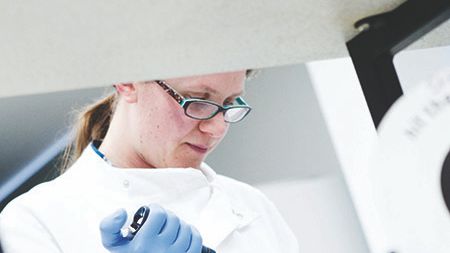
Press release -
Forensic Science courses achieve formal accreditation
Northumbria University’s forensic science courses have been officially accredited by the leading professional body for forensic practice.
The Chartered Society of Forensic Sciences is the only international professional body for forensic scientists and works to drive forward global standards in scientific investigation.
Northumbria’s undergraduate and Master’s courses in Forensic Science and the undergraduate course Criminology & Forensic Science have met the criteria required for the three component standards of this accreditation which cover laboratory analysis; the interpretation, evaluation and presentation of evidence; and crime scene investigation.
Northumbria’s forensic science courses are taught by former practitioners who have worked on high-profile cases including the Stephen Lawrence, Joanna Yeates and PC Ian Broadhurst murders and the Ipswich serial killer case in which five women were murdered over a ten-day period in 2006.
Students learn in the University’s on-site crime scene house and court room which helps to prepare them in assessing crime scenes and giving evidence in court cases. They gain hands-on experience in all relevant forensic fields including body fluid and DNA analysis, trace analysis, blood pattern interpretation and analytical chemistry in drugs and toxicology.
In recent years Northumbria has made significant investments in industry standard tools to enable students to gain first hand practical experience in all aspects of forensic analysis and interpretation. The University’s kit includes GCMS and LCMS analytical chemistry instrumentation, a GRIM machine which is used to analyse glass, comparison microscopy, microspectrometers for the analysis of fibres and a specialist DNA free laboratory using forensic standard materials and methods.
Students also benefit from the lecturers ongoing research into areas including low template DNA analysis, the significance of trace evidence and the interpretation of toxicological findings.
Sophie Carr, Programme Director for Forensic Science at Northumbria, is a former senior forensic scientist with the Forensic Science Service. Her specialist expertise lies in the analysis and interpretation of bodily fluids and DNA.
She said: “The Chartered Society of Forensic Sciences is the main professional body for those working in the industry in the UK and their accreditation process is designed to provide assurance that courses are fully reflective of the necessary elements required of a forensic scientist.
“We were already confident that our courses had exceptionally high standards and offered students a well-rounded education in all elements of forensic analysis, evaluation and preparing them to present evidence in court. However, it is very pleasing to see that these standards have been recognised by our professional body.”
Second year student Lizzie Rose said: “The course offers a great range of modules to give an insight into all aspects of forensic science, with the opportunity to get hands on experience in the laboratory providing a great way to consolidate material taught in lectures. The crime scene house is loved by all students to get a feel for real life, practical situations.
“Overall the University provides fantastic learning facilities, combined with lecturers who have previous experience in the forensic field, creating a degree worthy of accreditation.”
Northumbria University is an active member of and contributor to the European Network of Forensic Science Institutes (ENFSI), the Royal Society of Chemistry and the Forensic Science Education Group.
For more information on forensic science courses at Northumbria, click here.
Categories
Northumbria is a research-rich, business-focussed, professional university with a global reputation for academic excellence. To find out more about our courses go towww.northumbria.ac.uk
If you have a media enquiry please contact our Media and Communications team at media.communications@northumbria.ac.uk or call 0191 227 4571.






